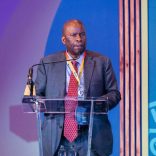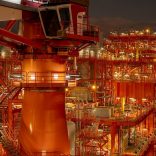Mozambique’s Mineral and Energy Minister joins African Energy Week as major LNG projects advance
Armed attacks not affecting Anadarko

The American oil and gas company Anadarko, which is the operator of Offshore Area One of the Rovuma Basin, off the coast of the northern Mozambican province of Cabo Delgado, has stressed that its operations have not been significantly affected by instability caused by Islamic extremists.
This is despite the attack on 20 January on the village of Maganja, which lies in Palma district within the area reserved for Anadarko’s construction of its liquefied natural gas (LNG) facility. The raid took place just seven kilometres from the main Anadarko camp.
Speaking at a Maputo press conference on Thursday, Anadarko’s support services manager Dayne Kells acknowledged that local communities have been affected and that there was a stoppage of work at the Anadarko site.
However, he added that the Mozambican defence and security forces have now sent reinforcements to the area.
The terrorists are often referred to locally as “Al Shabaab”, although they have no known affiliation with the Somali group of that name. They began their insurgency in October 2017 in Mocimboa da Praia district.
Kells said that it was premature to talk about the date for the start of LNG production as the final investment decision (FID) has not yet been taken. However, he expects the decision to occur in the first half of this year.
He revealed that the company currently employs just over 5,000 people on the project, 40 per cent of whom are from Palma district. Foreign workers make up just four per cent of the workforce. Most of the workers are involved in support activities such as road construction, housebuilding for those who will be resettled to make way for the LNG plant, and installing water supply systems.
The project will be huge, with the harbour taking up the equivalent of half the area of Maputo port. It will include a two kilometre long jetty for tankers to dock for loading up with LNG. Dredging will be needed to accommodate ships with a draught of up to 13 metres.
As for the resettlement of local people away from the construction site, Anadarko’s Robert Gerrits stressed that the company has a motto: ‘we do not carry out the resettlement of communities, we carry out resettlement with the communities’ because “the community actively participates in the process”.
Gerrits explained that “the resettlement is not only a process of moving people. It is a very complex process that also includes the payment of compensation and the restoration of livelihoods”.
Anadarko intends to move 556 households to new homes that are currently under construction. The resettlement is due to begin in the third week of March and continue until April 2021. A further 962 households will experience the loss of cultivated land and other assets. According to Anadarko, “all displaced households will receive compensation, replacement of agricultural land and the opportunity to participate in livelihood programmes”. In addition, 4,000 fishermen affected by the planned developments will be given various kinds of compensation.
The company will also support social responsibility initiatives including chicken rearing, horticulture, the creation of a community radio station, and projects covering health, nutrition, security, and road safety. In addition, it will establish a community development fund for the Afungi Peninsula, where the LNG facilities will be installed.
Offshore Area One is estimated to hold 75 trillion cubic feet of recoverable natural gas. To monetise the gas Anadarko will pipe it to Palma where it will be liquefied and shipped to clients worldwide.
The Anadarko project will be Mozambique’s first onshore LNG development. It will initially consist of two LNG factories (known as “trains”) with the capacity to produce 12.88 million tonnes of LNG per year. Anadarko plans to expand the project in stages up to a maximum of 50 million tonnes a year. In addition, Area One will supply 100 million cubic feet of natural gas per day for domestic use in Mozambique.
It is expected that LNG production will commence in 2024. However, this will not be the first project to produce LNG from the Rovuma Area. The consortium operating Offshore Area Four of the basin, headed by the Italian energy company ENI, has opted to build a floating LNG unit that will sit on a platform above the Coral South Field, and it is expected to produce its first LNG by 2022.
Anadarko holds a 26.5 per cent stake in Area One. Its partners in the consortium are Mitsui of Japan (20 per cent), the Indian companies ONG Videsh, Beas Rovuma Energy, and BRPL Ventures Mozambique (each with 10 per cent), PTTEP of Thailand (8.5 per cent), and Mozambique’s own National Hydrocarbon Company (ENH), with the remaining 15 per cent.












Leave a Reply
Be the First to Comment!
You must be logged in to post a comment.
You must be logged in to post a comment.